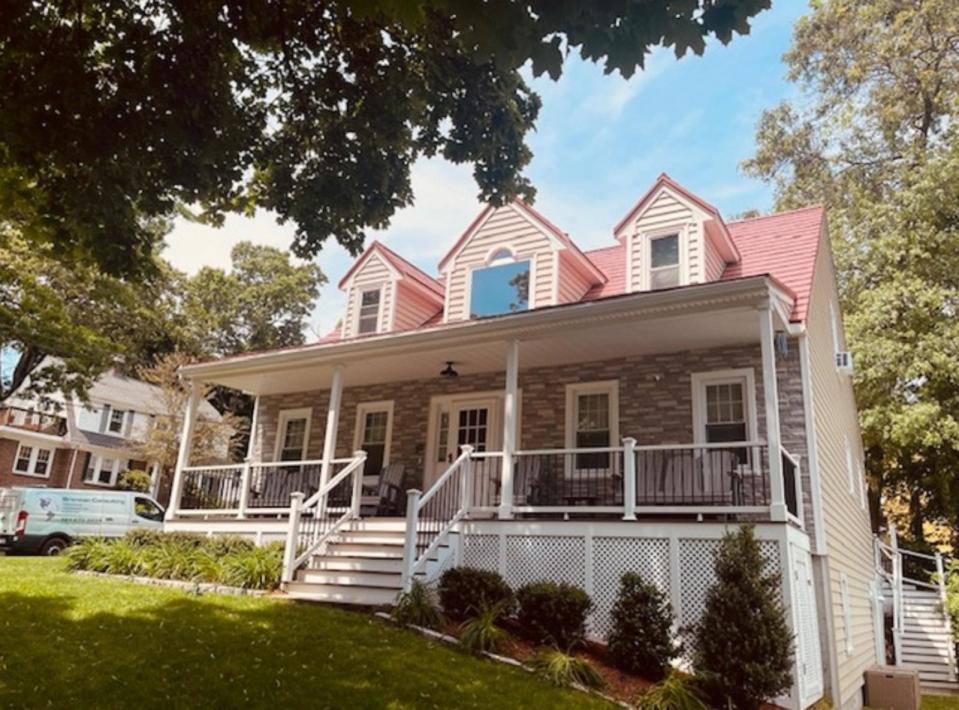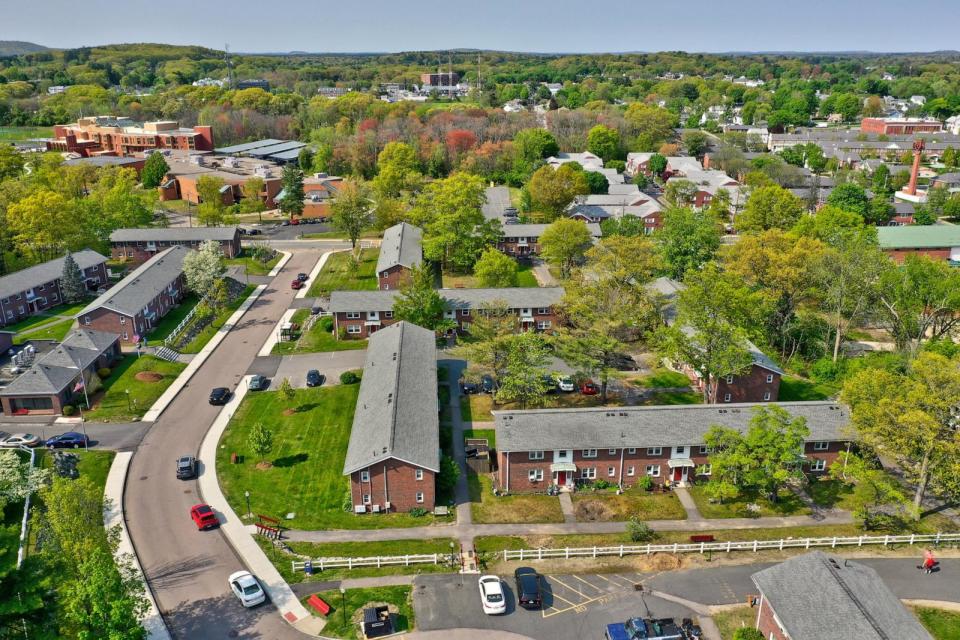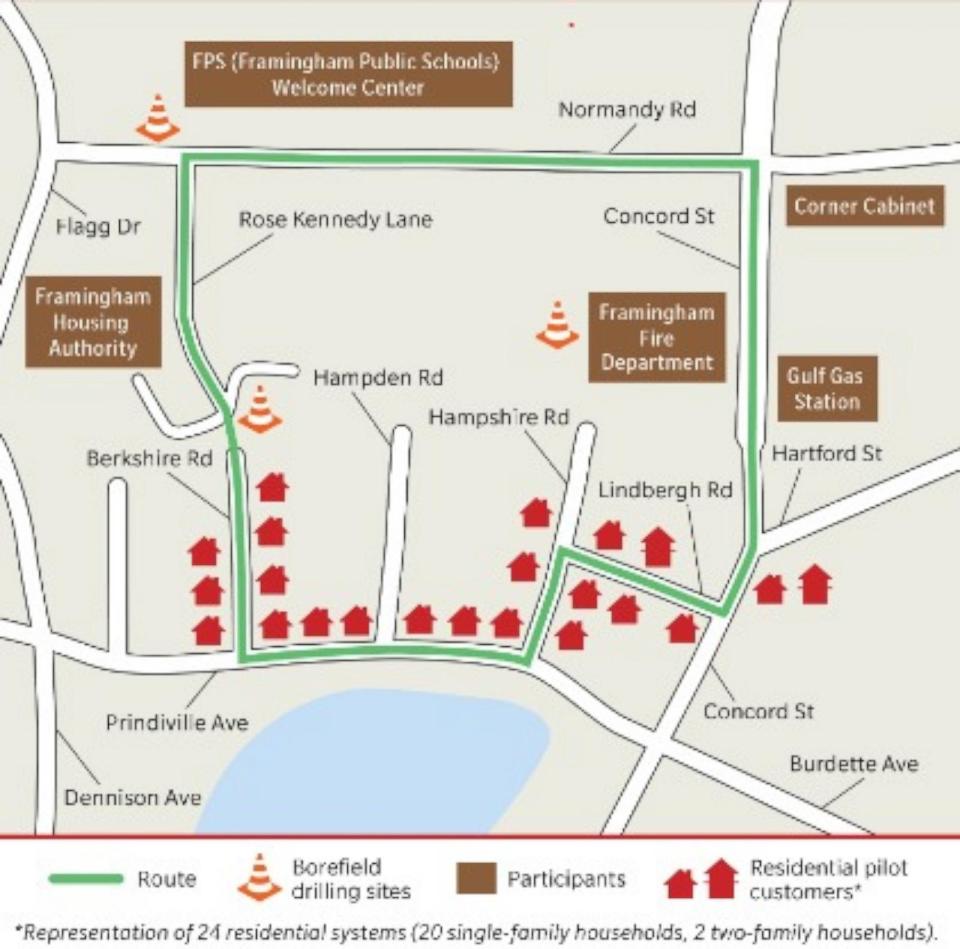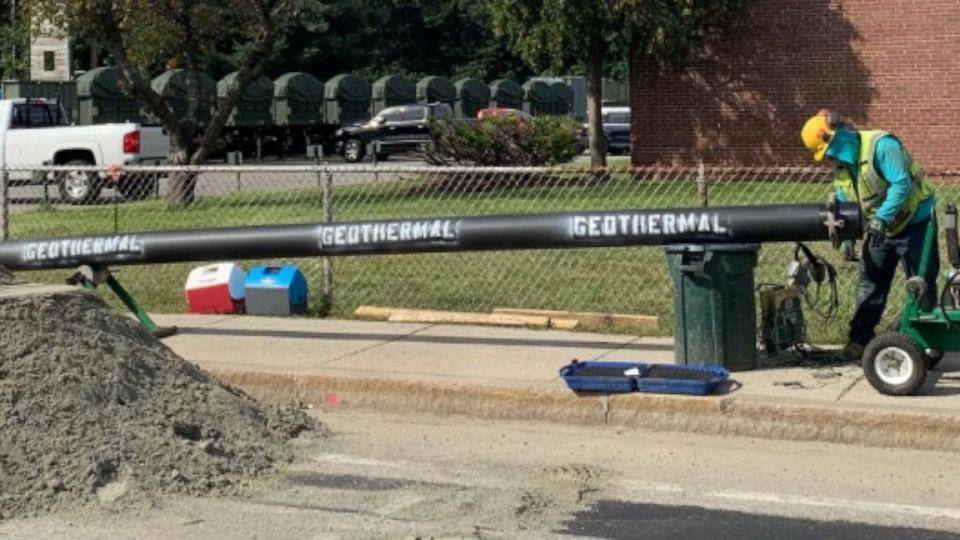A Massachusetts neighborhood could be the envy of sustainability enthusiasts in the state after it was picked by an energy provider as the location to install the first-ever utility-run geothermal network in the country.
Geothermal energy itself -- the process of using gravity and water to power buildings -- is not new. But Eversource, an energy provider serving customers in Connecticut, Massachusetts and New Hampshire, is the first utility company to install and run a geothermal network that will power dozens of homes and businesses in a state-designated "environmental justice" neighborhood in Framingham, a town of about 71,000 located between Worcester and Boston.
MORE: The emerging world leader in climate tech could soon be Massachusetts, experts say
About three dozen homes and businesses in Framingham will be retrofitted to have the structures obtain their cooling and heating from the network. The neighborhood was chosen because of its environmental justice population, which included some lower income and immigrant residents. That population drove the need to create affordability for utility bills, Ania Camargo, senior manager of thermal networks at the Building Decarbonization Coalition, told ABC News.
ADVERTIsem*nT
In Massachusetts, an environmental justice population is one where one or more of the following criteria are true: the annual median household income is 65 percent or less of the statewide annual median household income, and minorities make up 40 percent or more of the population.
Typically, only the wealthiest of residents would have access to the funds needed to retrofit their homes for geothermal energy, Camargo said.
"So there is a little bit of an equity issue going on, because the people who can't afford it are staying on the system," she said.
Both residential and commercial customers are expected to see significant cost savings -- up to 20% savings off their average utility bill, Nikki Bruno, vice president of clean technologies at Eversource, told ABC News. Broadly, Eversource expects a 60% reduction in greenhouse gas emissions from those customers, Bruno said
Experts were aiming for a mixed-use community -- a combination of homes and businesses -- for the pilot. As energy is pulled into a grocery store, which requires ample cooling, it is rejecting heat that can then be used to warm homes down the street, Camargo said.
MORE: Universities swapping energy sources to geothermal now a growing trend
Residents in the neighborhood are currently relying on gas and oil for their heating needs, and electricity to power their air conditioners -- most of them not central air, Eric Mauchan, a homeowner whose Cape Cod-style home will be retrofitted for the new system, told ABC News.
The buildings are expected to maintain an average temperature of about 70 degrees. Since it is a pilot program, Eversource will pay for the installations in each building.
Local residents Eric and Jennifer Mauchan feel like they "won the home lottery" after they were picked as candidates for the pilot program, they said.
"Everyone knows that our neighborhood has been chosen," Jennifer Mauchan said. "Everyone is envious of our situation."
MORE: This is how heat from a volcano can be used to power an entire town
As of Tuesday, the $15 million networked geothermal system was up and running, according to Eversource. Customer conversions for the first loop will continue through the summer, and Eversource plans to connect more loops to the new network in the coming years, Bruno said.
Gina Richard, owner of the Corner Cabinet Corporation, told ABC News she was making plans to replace the 20-year-old heating system at her business when she was approached by Eversource in late 2021. Now, the utility company will cover the cost.
Richard expects her utility bills -- sometimes running up to $1,000 a month for her 3,000 square foot store front -- to be significantly lowered due to the switch, she said.
"It just seemed like a win win when they offered the pilot program," she said.
On a wider scale, the switch to sustainable methods to power homes and businesses is expected to have a significant impact to emissions mitigation. Buildings account for about 30% of economy-wide emissions due to the fossil fuels expended to complete simple tasks such as cooking, laundry and cooling and heating homes, according to the International Energy Agency, an intergovernmental organization.
MORE: Why green hydrogen is the renewable energy source to watch
What Eversource has demonstrated with its pilot is that buildings don't need to be transitioned one at a time and that whole neighborhoods can be eliminated from fossil fuels at once, Camargo said.
Thermal energy networks are the most efficient method in existence to heat and cool buildings, Camargo said. Instead of gas, water is carried through the pipes buried beneath the earth, and furnaces inside buildings are replaced with ground source heat pumps connected to water loops -- a system that works akin to a conveyor belt transferring energy from inside to out or from outside to in.
"The reason why it's so efficient is because we're transferring energy," Camargo said. "We are not creating new energy. We're just literally transferring it."
Massachusetts is closing the gap with California and New York for the conception and implementation of climate technology. Massachusetts Gov. Maura Healy has even written a $1 billion proposal for Massachusetts to become a global leader in climate technology.
The emergence of environmental startups and think tanks are among the reasons why the Bay State may emerge as the nation's climate solution hub in the near future, some experts say.
"Massachusetts is on the cutting edge of leading an unprecedented clean energy transition in New England, and our networked geothermal pilot exemplifies the collaboration that is essential to achieving decarbonization goals," said Joe Nolan, chairman, president and CEO of Eversource.
It remains to be seen whether geothermal networks will spread to other areas. In addition to the funds needed to retrofit homes, geothermal energy is location restricted and can't be used everywhere. Locations that offer constant heat flow form the center of the earth — such as Iceland and the western U.S. states and Hawaii — are ideal locations for geothermal systems to be installed.
City of Framingham Mayor Charlie Sisitsky said in a statement to ABC News that the city is committed to achieving net zero emissions by 2050 and recognizes "the critical role" that solutions like networked geothermal will play in achieving this goal.
"With deep gratitude to the Commonwealth of Massachusetts, Eversource, HEET, and the many other local organizations and community members who have helped us to reach this remarkable milestone, we look forward to the connection of residents, businesses, and municipal facilities to this network through the official launch of the pilot and exploring future opportunities to extend the benefits of clean heating and cooling across the community," the statement added.
A first-of-its-kind geothermal system will cool and heat dozens of homes in Massachusetts originally appeared on abcnews.go.com



